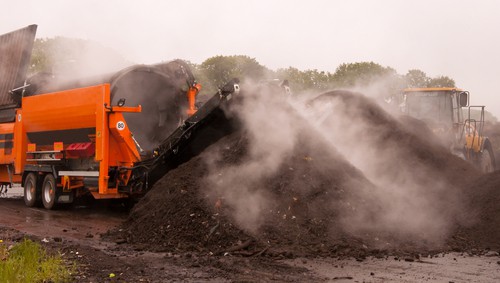Revisions to make the compost quality standard – PAS 100 – “more robust” came into effect yesterday (19 September).
Changes to the standard include a new clause to make clear the existing requirements for compost producers to agree with customers their quality requirements, so that the compost produced is “fit-for-purpose”.
PAS 100 is the quality standard for compost produced by industrial composting facilities, and “widely recognised” within the organics recycling sector.
Plastic
Georgia Phetmanh, governance manager at Renewable Energy Assurance Limited (REAL), explained that there has not been any change in the plastics limit for the new PAS standards. This will remain at the current limit of 0.12% mass permitted.
However, Ms Phetmanh explained that the way the composting process is managed will change under the new specification, with teams set up within each company to control hazards affecting the quality of compost produced, to meet the requirements of the customer.
Compost producers are audited annually by three independent bodies appointed by REAL to inspect the sites and the processes. The annual checks are already in place as part of the certification scheme, however, further checks are planned to be introduced into the audit process.
REAL – a subsidiary of the Renewable Energy Association (REA) – carries out a range of certification and consumer protection activities.
Consultation
Yesterday, REAL announced that, as a result of the revisions, farmers, food producers, manufacturers, retailers, and consumers of certified compost can have “more confidence” in the compost they use.
Over a period of two years, the standard, officially known as a specification, has been reviewed and revised to incorporate new requirements, according to REAL.
The updated standard – BSI PAS 100:2018 – is the result of an extensive stakeholder consultation, launched last year (see letsrecycle.com story).
A wide range of industry stakeholders engaged in discussions on how to make PAS 100 fully up-to-date and fit-for-purpose, according to REAL said, which sponsored and led the revision process.
Evidence
REAL’s Georgia Phetmanh revealed that organisations had put in proposals for changes to certain limits in the PAS standard. However, she explained that these were not accepted due to a lack of “scientific evidence” to support some of the proposals.
“It was recognised that there is a lack of financial support for the necessary research to be undertaken,” REAL said. “For this reason, REAL has devised a mechanism to source funding from the composting and AD industries, in the form of a Research Hub.”
The REAL Compost and Biofertiliser Certification Schemes’ Research Hub has been set up “so that the industry will be prepared with the evidence base to support future updates to PAS 100,” and other certification scheme protocols (see letsrecycle.com story).
“The ORG is delighted that this revision took place in order that it assists in building confidence in the market for this valuable resource.”
Jeremy Jacobs
REA
Commenting on the new specification, Jeremy Jacobs, technical director of REA said: “It is essential that any standards are relevant to current market conditions, and the PAS 100 Standard is no exception.
“The ORG is delighted that this revision took place in order that it assists in building confidence in the market for this valuable resource. We are particularly encouraged by the development of the Research Hub to further build evidence in the future for further improvements to the Standard and ensuring it is fit for purpose in the 21st Century.
‘Delighted’
”Virginia Graham, chief executive of REAL added: “After two years of working closely with industry and the British Standards Institution (BSI), we are delighted to welcome today the new specification for composted materials.
“The collaborative process of revising PAS 100 was a valuable exercise in furthering understanding of what is considered a robust quality standard by producers, markets, and regulators.”
The post Compost quality ‘to improve’ with PAS 100 revisions appeared first on letsrecycle.com.
Source: letsrecycle.com Plastic




